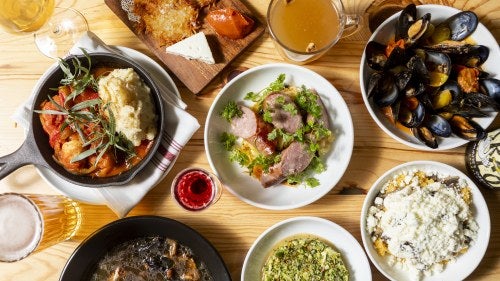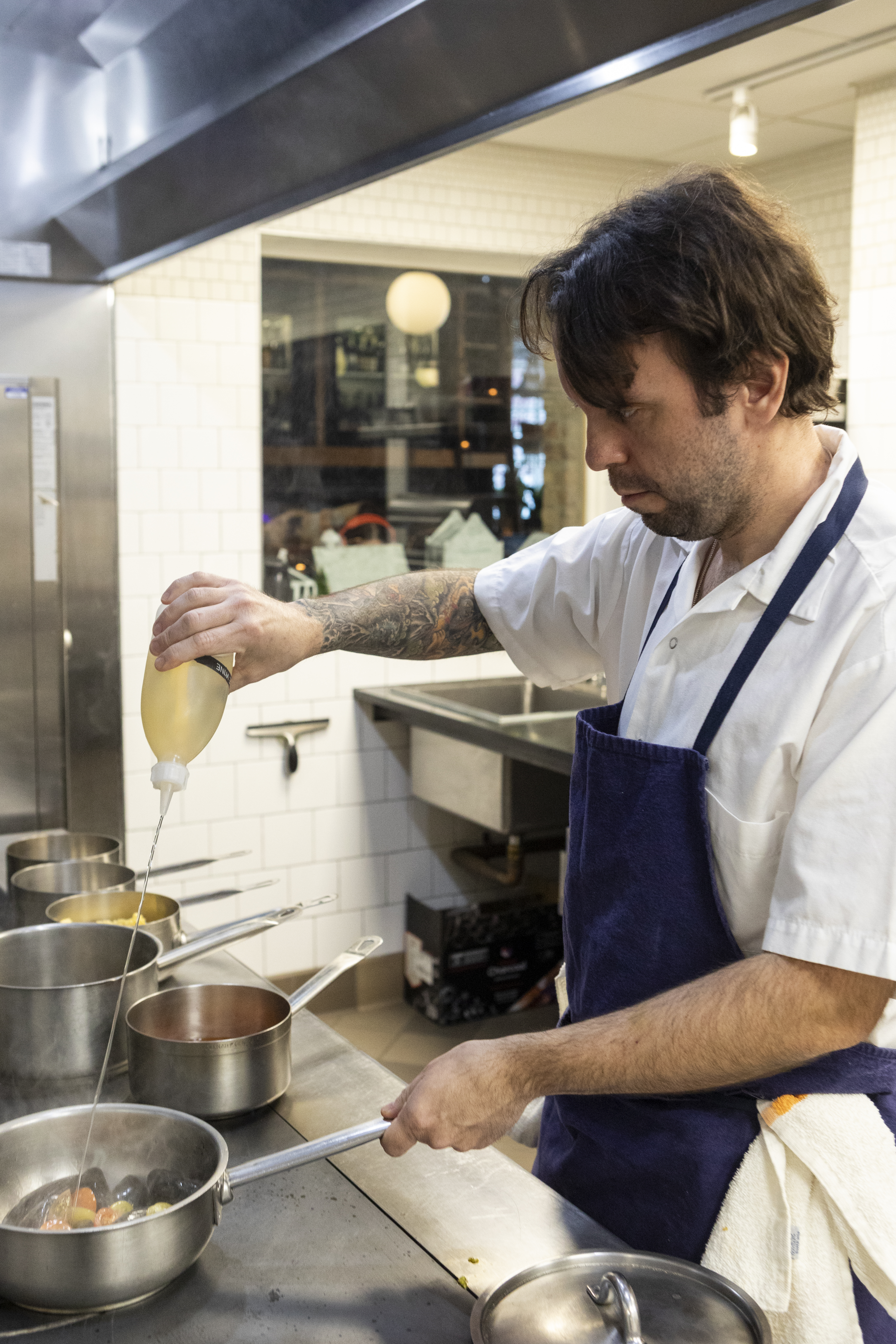New Chicago restaurant has a dual mission: a Michelin star and respect for Ukrainian cuisine

Chef Johnny Clark calls his new Ukrainian restaurant Anelya a “political statement” to the world that Ukrainian food “isn’t just Russian with a twist” — and that it deserves a Michelin star of its own.
“Everytime there is an oppressor, they start with food,” award-winning chef Johnny Clark told ChicagoGlobal.
Clark and his wife, Beverly Kim, opened Anelya last October down the block from their Michelin star-winning restaurant Parachute in Avondale. Named after his grandmother, Anelya Ochatchinskiya, the restaurant is what Clark calls a “political statement” to the world that Ukrainian food “isn’t just Russian with a twist” – and that it deserves a Michelin star of its own.
A family legacy and a response to war
Clark grew up in Cincinnati and was very close with his grandmother, who moved to Ohio after World War II. She was born in Ukraine in 1924, Clark said, and survived the Holodomor – a man-made famine imposed by Stalin in the early 1930s that led to millions of deaths. During the war, Clark said, “she was taken by Nazis and did forced labor for three years.”
“My grandmother had a lot of trauma,” Clark said. He explained that she was “very proud to be Ukrainian,” but, at the same time, she “would even maybe try to forget that she even lived in Ukraine … it was like she never even wanted to go back.”
In Cincinnati, Clark said, he didn’t know any other Ukrainian families – he wouldn’t meet any until he moved to New York in his 20s. With few other immigrants in his slice of Ohio, “everything was foreign there,” he said.
“For many years, I was in denial or maybe insecure that anyone would like Ukrainian food,” he said. Clark worried the food was too different, with “lots of fish, lots of foreign smells and textures.” Instead of cooking Ukrainian food, he pursued French cuisine and “anything that wasn’t what I deep inside really wanted to do.”

Clark’s grandmother Anelya Ochatchinskiya in the mid-1940s after being liberated from a Nazi forced labor camp in Heidelberg, Germany.

Clark grew up in Cincinnati close to his grandmother, both pictured here in 1980.
That changed when Russia invaded Ukraine in 2022.
“When the war happened, something just ignited with me. I think it was just all the stories that I learned as a child. And it just made me want to do something,” he said.
“There wasn’t much that I could do except for cook. And I felt like I had an opportunity – and a duty – to spread Ukrainian food and culture because it’s under attack again.”
A food fight over Ukrainian identity
Despite his awards and professional success, Clark knows that the restaurant industry is “probably not the best business to get into, especially on our small level” for folks “looking to make money.”
Instead, he describes Anelya as part of a new mission to elevate Ukrainian cuisine.
“It’s slightly a political statement to show that this cuisine can be something that is respected, because that’s something that Russia has tried to discredit,” he said.

“I want people to see that this is not Russian food with a twist,” he added. “This is Ukrainian food.”
Russian President Vladimir Putin has said that he believes “Russians and Ukrainians are one people … one nation, in fact.” At the end of 2022, the U.N.’s special rapporteur for cultural rights told The New York Times that one of the justifications given for the war is the idea that “Ukrainians don’t have a distinct cultural identity.” The war’s aim, she added, is “a gradual destruction of a whole cultural life.”
“I feel like every time there’s an oppressor, they start with food,” said Clark. “They dehumanize, they attack the food, then the language, and so on and so forth. But it seems to always start with the food.”
Clark’s menu emphasizes traditional Ukrainian dishes, including items like zakuski, which are small snacks hosts use to welcome guests into their homes, and holubtsi – a stuffed, rolled cabbage often served with a sauce.
“I tried to keep the foods traditional … but I also wanted to push boundaries,” he said.
That’s why Clark has created vegan takes on Ukrainian classics. He said he “wanted to show that this food can also evolve – it’s not a relic of the past.”
Pushing those boundaries comes with risk.
“We have some guests, they’re like, ‘Whoa, what the hell is this? This is not Ukraine, this is not Ukrainian food.’”
Clark said he’s grown a thick skin after a decade in the restaurant industry, but that criticisms like these can still sting.
“Because I’m pushing forward with something that I was insecure about throughout my life, about whether or not people would like this food, that can hurt – that people don’t think it’s Ukrainian, or I’m an imposter because I’m not completely Ukrainian either. I don’t have a Ukrainian last name,” he said.
“I get a little bit of that imposter syndrome sometimes, but I know my story and I know what I’m passionate about.”
What does success look like?
Though it only opened in October, Anelya has earned praise from Time Out Chicago, who described the restaurant as “thrilling and soul-warming,” and the Chicago Tribune, which said Clark and Kim had begun “a new Ukrainian revolution.”
Clark and Kim have already received some of the industry's highest honors over at Parachute, including a Michelin star and a James Beard Award..
But there aren’t any Ukrainian restaurants with a Michelin star, and Clark knows how that kind of recognition can resonate throughout the restaurant industry.
“It commands a certain amount of respect of the food that you’re serving or the cuisine,” he said. “I think it uplifts not just the restaurant that got the award, but other restaurants and other Ukrainian businesses as well.”
“It would mean a lot to other Ukrainians to say that, ‘Hey, did you know that there's a Michelin-star Ukrainian restaurant?’”
His first marker of success for Anelya, though, is to introduce people to Ukrainian cuisine and “to get people to see that Ukrainian people and Ukrainian cuisine are their own – have their own – culture.”
“We want you to put food in your mouth, not political statements,” Clark said. “I feel that I’m doing that through a very gentle, fun way: showing people that Ukrainian food is real. It’s something of substance and history.”
This story first appeared in the ChicagoGlobal newsletter, a joint project of Crain's Chicago Business and the Chicago Council on Global Affairs.

